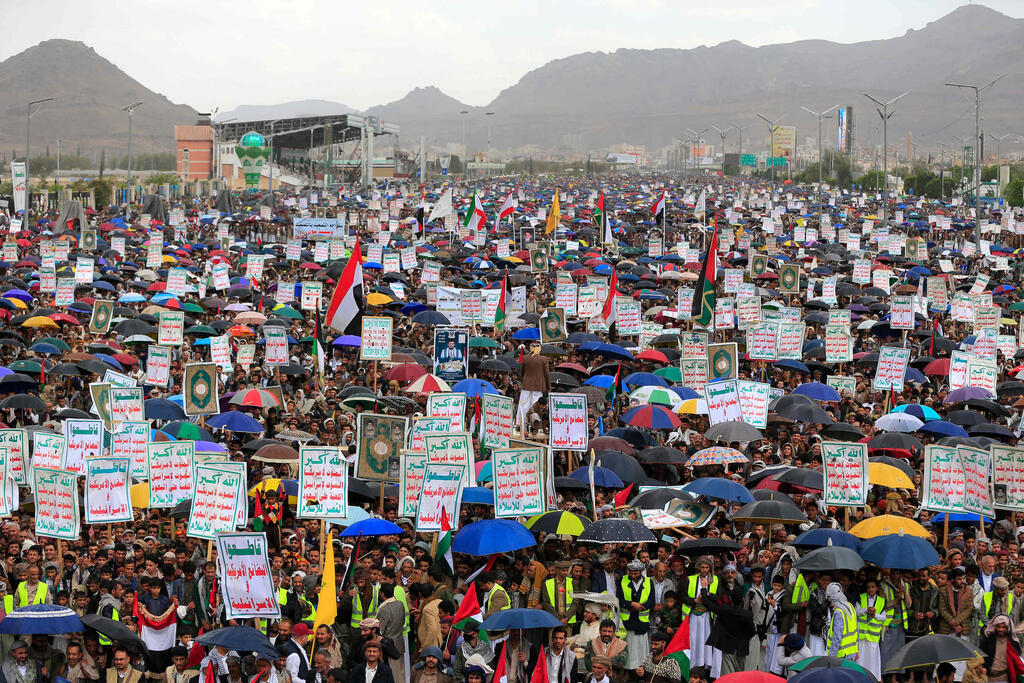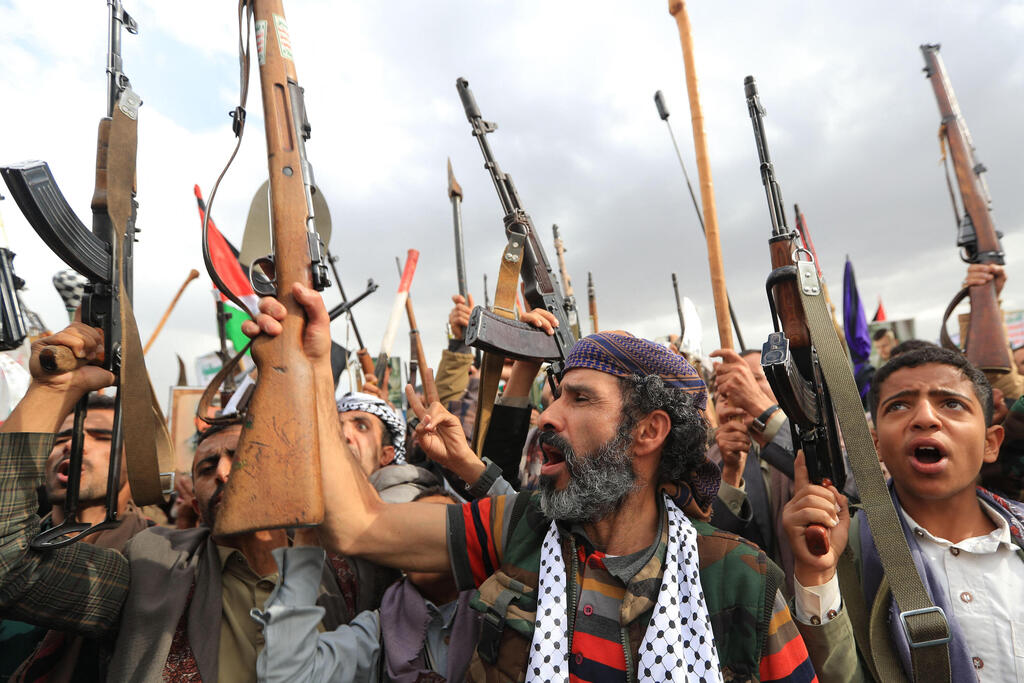The ports of Hodeidah and Ras Issa have been repeatedly bombed, damage to Sanaa’s airport is estimated at $500 million and smuggling routes from Iran have been blocked.
After U.S. President Donald Trump announced the suspension of the military campaign in Yemen, the Houthis pledged to repair the damage and continue attacking Israel “no matter the cost.” On the same day, they launched a missile toward Israel, sending millions of civilians into shelters.
Aftermath of Israeli airstrikes on Sanaa International Airport
(Video: Reuters)
So what is their plan? How do they continue to operate despite the severe humanitarian crisis in areas under their control? And why haven’t they collapsed?
The Houthis make their demands of Israel clear and constant. Regarding the Israeli-Palestinian conflict, they insist on an end to the war in Gaza, the opening of border crossings and the delivery of aid—what they describe as “lifting the siege.” Until then, they say, there is nothing to discuss. Neither American strikes—nor Israeli strikes this week—have deterred them from continuing to launch drones and missiles at Israel. Until Trump’s announcement, they were also targeting U.S. aircraft carriers and naval vessels in the Red Sea.
Trump said Thursday the Houthis had a "great capacity to withstand punishment." The U.S. military had targeted the Houthis even before Trump, but the past two months have seen the most intensive American air campaign against them since 2017. Still, the Houthis emerged from the operation with a commitment not to strike American ships—while stressing that the agreement “in no way whatsoever” applies to Israel, and that attacks against it will continue.
“We hit them very hard,” Trump said. “They took tremendous punishment. You could say there’s a lot of bravery there—it was amazing what they took. But we honor their commitment. They gave us their word that they wouldn't be shooting ships anymore, and we honor that. Hopefully, that’s over with. Just leave those ships alone.”
7 View gallery
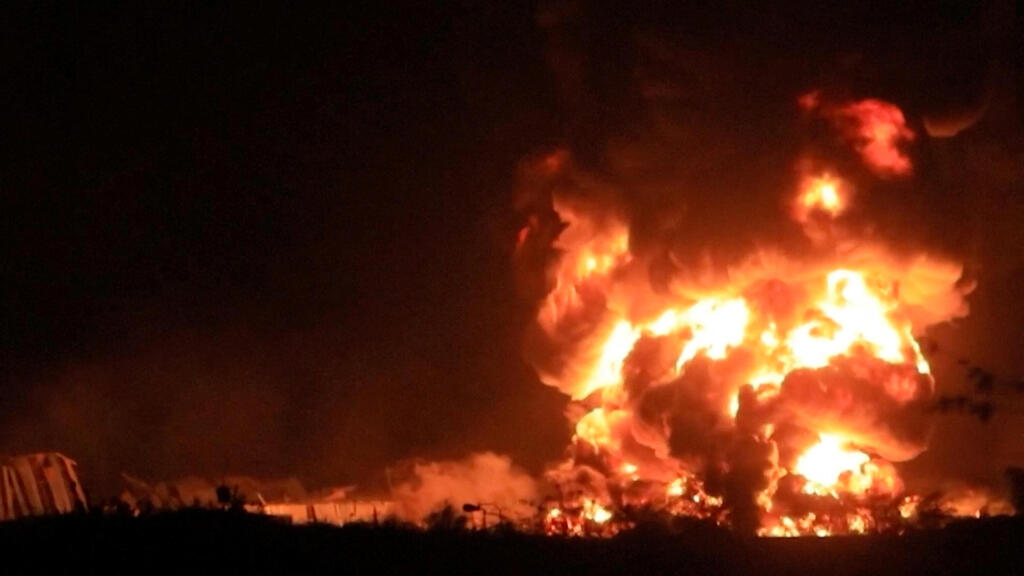

Israeli fighter jets strike Yemen's port of Hodeidah
(Photo: AL-MASIRAH TV/Handout via REUTERS)
7 View gallery
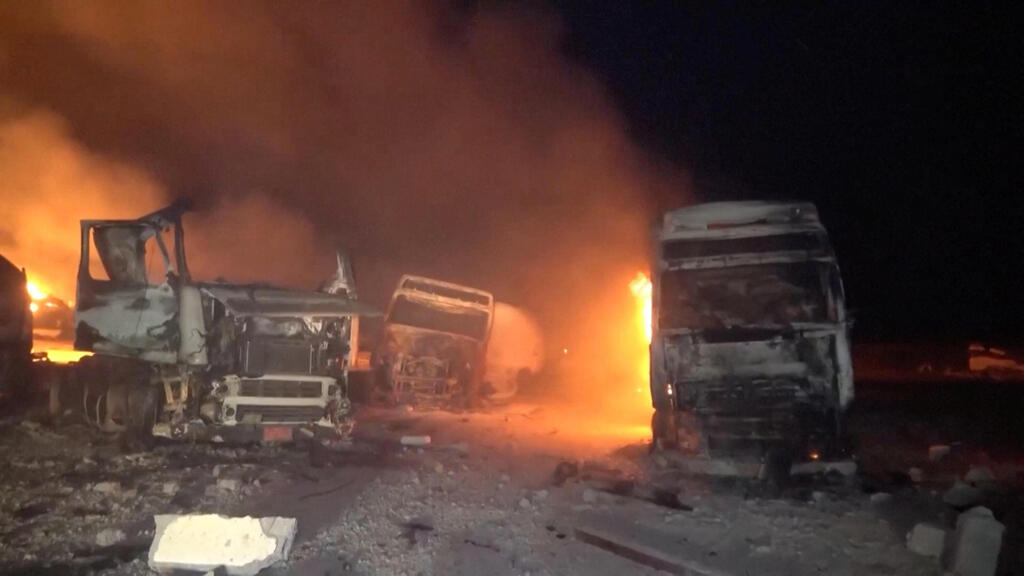

Aftermath of US strikes on Yemen's Rass Issa port
(Photo: Al-Masirah TV /Handout via REUTERS)
7 View gallery
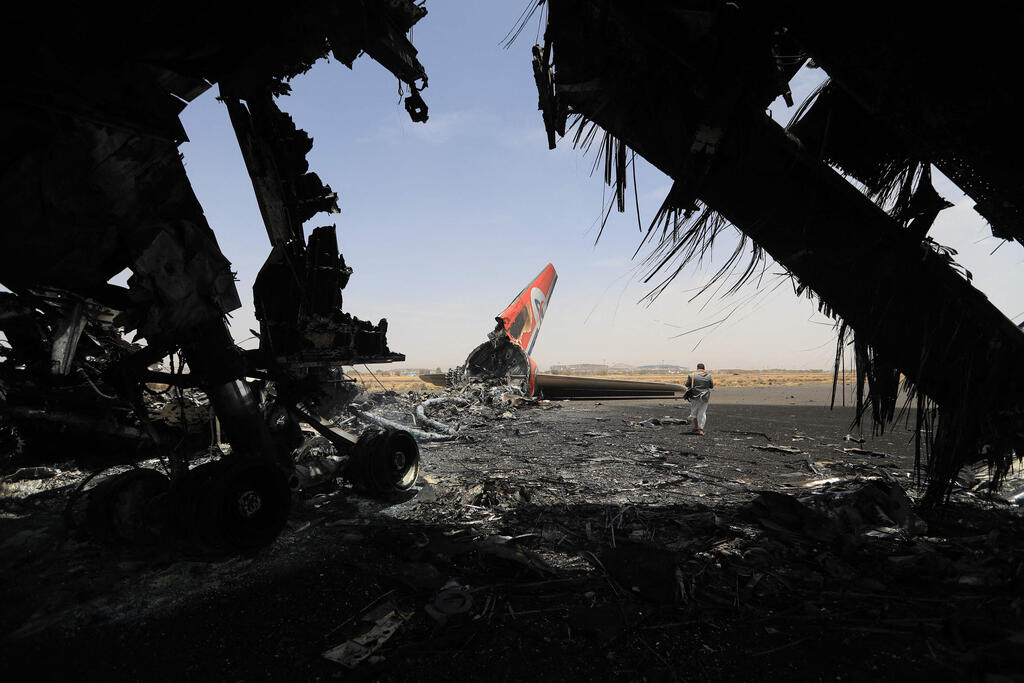

Airplane destroyed in Israeli strike on Sanaa International Airport, Yemen
(Photo: Mohammed HUWAIS / AFP)
Despite the significant strikes on their missile and weapons depots, the Iran-backed Yemeni rebels claim they continue to advance in weapons development. After Israeli strikes this week in Hodeidah and Sanaa, they again threatened retaliation and warned they would expand their list of targets in Israel. They also accused Israel of trying to stir public unrest through these attacks.
But Yemenis in Houthi-controlled areas don’t need Israeli airstrikes to feel discontent. In reality, they have no shortage of reasons to rise up against the terror group that has seized large parts of their country, exploits them, worsens their daily lives and pours money and resources into military capabilities—rather than stabilizing the country and helping its people.
Persecution, poverty and indoctrination
In recent weeks, reports have increased of arrests carried out by the Houthis in areas under their control in Yemen. The daily U.S. airstrikes prior to Trump’s surprise announcement, along with growing speculation about a possible ground operation against the group, have led the terror organization to tighten security, intensify surveillance and go deeper into hiding.
Houthi policies have had sweeping effects—militarily, economically, socially, tribally and even in health and media sectors. Last month, Qatar-based outlet The New Arab reported eyewitness accounts of Houthis pursuing and arresting street vendors, imprisoning them and barring them from working. The group has cracked down on any potential leaks of information about its activities, closely monitoring citizen movement, gatherings and behavior.
7 View gallery
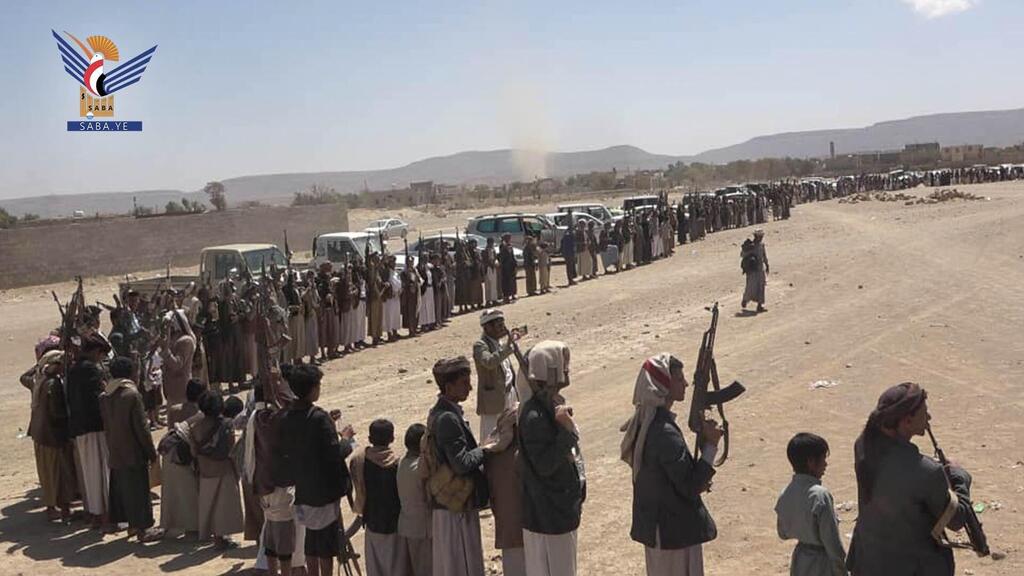

Gathering in Yemen in support of the Houthis. Children are taken to indoctrination camps
Sources told the newspaper that these measures began in the second half of 2024, but intensified as operations against the Houthis expanded, especially following the surge in U.S. airstrikes. According to the report, the Houthis' greatest fear is being targeted with advanced technical or technological means—similar to those used against Hezbollah in Israel's pager operation last year.
They have ramped up internal communications monitoring and begun spying on local tribal and political leaders. Shop owners have been ordered to remove street-facing security cameras, and recordings have been confiscated to prevent footage of senior figures, vehicles or military equipment from leaking.
The Houthis have also further isolated Yemenis in the territories they control and have harmed the education system. In recent days, Saudi-owned newspaper Asharq Al-Awsat reported that the group has banned the teaching of English in early elementary grades—a first in the country’s history. The decision was met with pushback from various segments of the population, including some pro-Houthi activists. The group issued directives suspending English instruction in grades 1–3 in all public and private schools in areas under its control.
In terms of movement restrictions, The New Arab reported that people who frequently travel between Houthi-held regions and those under the internationally recognized Yemeni government are subject to tight monitoring.
7 View gallery
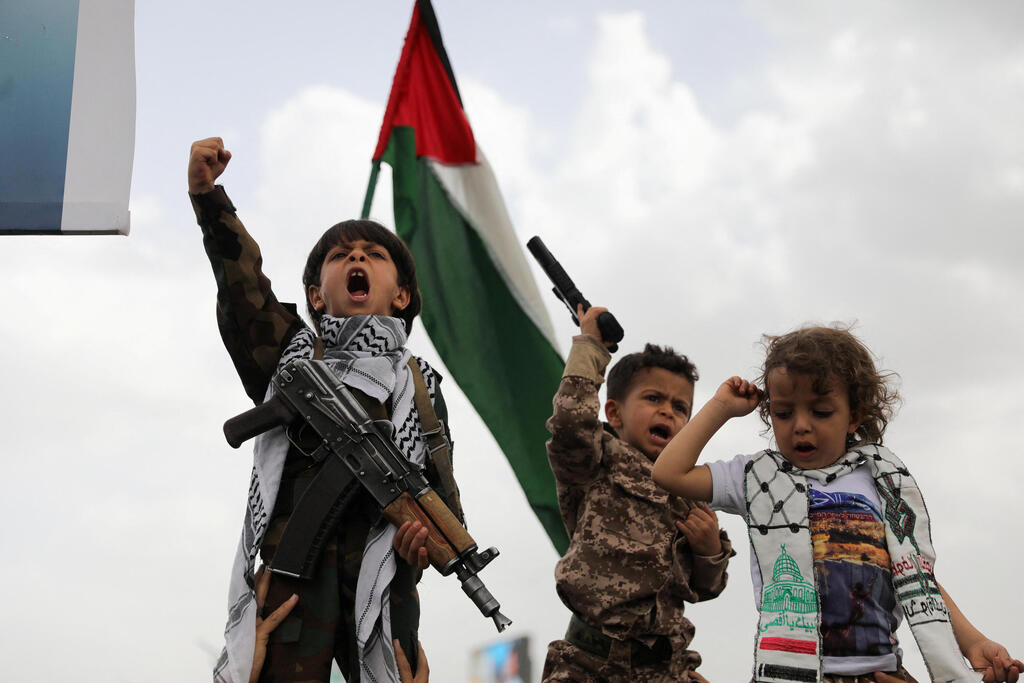

Children at a Houthi demonstration in Sanaa last month
(Photo: REUTERS/Khaled Abdullah)
Press freedom in Yemen remains under the grip of the Iranian proxy. Anyone who publishes information, images or footage of attacks risks arrest. Discussions of the Houthis’ economic losses or disclosure of the number and locations of wounded fighters are forbidden. Control has tightened over hospitals, medical centers and doctors.
Economically, sources told the Qatari newspaper that banking operations and money transfers are now under stricter control. The Houthis fear funds being transferred out of their territory to Aden, where the legitimate Yemeni government is based. Since the outbreak of the war in Gaza, the Houthis have run fundraising campaigns to support their military activities—often by extorting civilians in areas under their rule.
In addition, the Houthis operate summer camps for children that include indoctrination and military-religious training, after which the youths are deployed to battlefronts. Civilians in Houthi-controlled areas are also required to attend mandatory courses called “al-Aqsa Flood,” named for the Palestinian term for the Gaza war, under the pretext of showing support for the Palestinian cause.
Vaccine denial, hunger and disease
As the country collapses and the Houthis pour resources into armament and warfare, senior members of the terror group continue to live comfortably while the population starves.
Medical sources in Yemen, along with international organizations, have long warned of local outbreaks of disease in Houthi-controlled areas. Last week, Asharq Al-Awsat reported that the military escalation and the group’s refusal to allow vaccinations have contributed significantly to the health crisis.
UN reports have confirmed thousands of cases of cholera, malnutrition and other illnesses in the first three months of this year. The Houthis have conducted an ongoing campaign against the vaccination of Yemeni children, describing vaccines as a “conspiracy.” Combined with the country’s dire conditions and lack of clean water, the health situation has become deadly.
Destroying Yemen, eyeing expansion
Testimonies in recent years make clear that the Houthis are devastating the areas under their control. Yet, senior members of the group continue to appear regularly on Arab news channels, painting a very different picture—one of total control and national unity under the banner of “support for Gaza.”
Houthi-affiliated media, led by Al Masirah, broadcast images of massive demonstrations across Yemen in solidarity with Gaza and against Israel. The question arises: What more do they seek beyond their clearly stated goals regarding Israel?
Get the Ynetnews app on your smartphone: Google Play: https://bit.ly/4eJ37pE | Apple App Store: https://bit.ly/3ZL7iNv
A Yemeni political analyst who spoke to Ynet on condition of anonymity due to recent events said the Houthis aim for full control of the state. “They are driven by an entrenched ideological belief that they hold the absolute truth—a mindset common to many religious movements,” the analyst said. “This belief makes them less willing to share power with other local factions, whom they view not merely as political rivals, but as enemies of their faith. This is evident in their public discourse, where they frequently label religious opponents as 'hypocrites.'”
The analyst added that the Houthis launched their movement in Yemen’s Saada province and captured the capital, Sanaa, in September 2014. They later expanded into other regions, including Hodeidah, Marib and al-Bayda. Although their territorial control has since diminished, they still maintain a grip on about a third of Yemen’s landmass, particularly in mountainous and highland regions.
According to the analyst, the Houthis’ ambitions stretch far beyond Yemen. “They seek to leverage their internal dominance to influence regional and international dynamics, as reflected in their maritime attacks and repeated assaults on Israel. They position themselves as a key player in the ‘Axis of Resistance’ led by Iran.”
In light of the weakening—if not collapse—of Iran’s other regional proxies, such as the regime of Bashar Assad, the Houthis' ambitions have only grown. “They are now the strongest remaining arm of the axis,” the analyst said. “They show no signs of ceasing efforts to shape regional and global events whenever opportunity arises, especially amid the ongoing geopolitical rivalry between East and West.”
“The Houthis’ recent actions have taught them how to exploit international interests—especially those of Russia and China—to exert strategic pressure,” he said. “This approach is likely to intensify following Trump’s announcement of an American withdrawal and Oman’s declaration of a mediation initiative that includes the Houthis. As a risk-taking movement, they show little regard for the harm their decisions cause Yemen. They wouldn’t hesitate to turn the country into the North Korea of the Middle East if it advances their ideological and political goals.”
If Israel learned anything from October 7, it is to take the beliefs of extremist Islamist groups seriously. The Houthi slogan, emblazoned on every sign and flag, reads: “God is great, death to America, death to Israel, curse the Jews, victory to Islam.” Therefore, even if the war in Gaza ends and the Houthis stop launching attacks, the capabilities they have already developed—and the time they may gain to rebuild—leave Israel facing a threat that is neither predictable nor controllable.
The Houthis, for instance, could suddenly decide to launch attacks over any event at the Temple Mount, or any minor incident in Nablus. The more power they accumulate, the more severe and lethal their actions could become. Officials in Israel understand that this situation cannot be allowed to continue.






